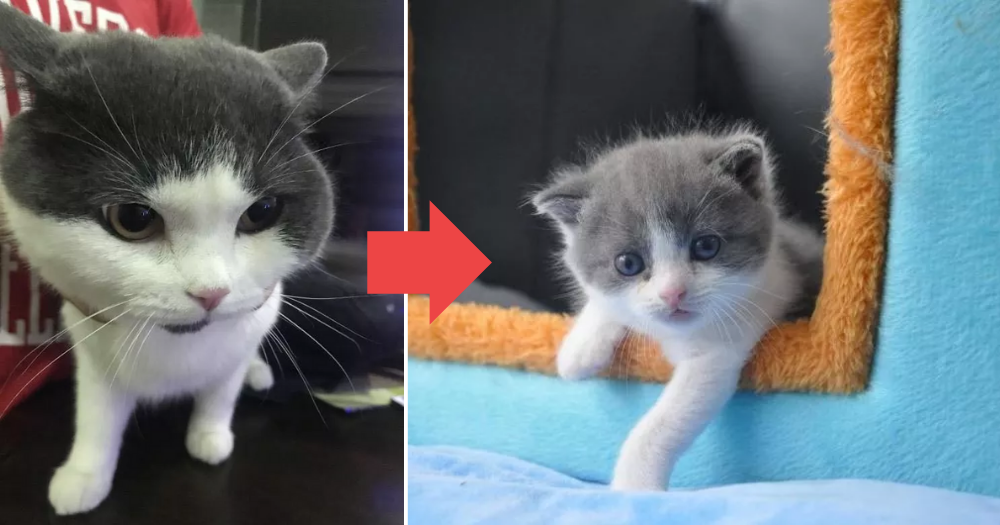Pet owners deal with pet deaths in different ways.
Some mourn and get over it, while others vow never to own another pet because losing one is already too painful.
But one particularly heartbroken pet owner in China took his grief to God level.
Grief-stricken over death of pet cat
Huang Yu, a 22-year-old businessman from China, was in grief after the death of his two-year-old cat, Garlic, in January 2019.
 Photo from Sinogene
Photo from Sinogene
Garlic had died from a urinary tract infection.
After its death, Huang buried the body of the British Shorthair in a park near his home.
Hours later, however, the man, still devastated, recalled reading something about dog cloning in China, reported the New York Times.
Wondering if he could do the same for Garlic, Huang dug up its body from the park and placed it in his home's refrigerator in preparation for cloning.
“In my heart, Garlic is irreplaceable,” Huang said.
Allegedly China's first cloned cat
Huang then approached Sinogene, a commercial pet cloning company based in Beijing, China.
Scientists from Sinogene travelled to Huang's house to collect skin cells from Garlic's frozen body
After about a month of deliberation, Huang decided to go through with the cloning procedure.
Hoping for a carbon copy of Garlic, Huang paid US$35,000 (S$48,437) to the company, despite initial reservations of the hefty price.
Huang stated however, that Garlic was worth more than that.
Garlic's skin cells were then implanted into eggs harvested from other cats.
After delivering an electric or chemical shock to the cloned eggs to induce the egg cells to start dividing, 40 cloned embryos were implanted into four surrogate mother cats.
Of this number, only three pregnancies were induced, two of which were miscarriages.
Garlic's clone was then created after the entire process, which took seven months.
Sinogene claims that this is China's very first cloned cat.
Clone not completely identical to original cat
The clone looked similar to the original Garlic, with the same grey and white fur.
Here are some adorable pictures of the new kitten.
 Photo from Sinogene
Photo from Sinogene
 Photo from Sinogene
Photo from Sinogene
 Photo from Sinogene
Photo from Sinogene
 Photo from Sinogene
Photo from Sinogene
Even though it might have the same DNA as Garlic, its appearance is not identical to the original cat.
Sinogene stated that clones might show slight differences in fur or eye colour.
Garlic's clone also lacks a prominent chin patch of darker fur that Huang's original pet sported.
The clone also has blue eyes, compared to Garlic's orange eyes.
And according to NYT, Huang reportedly said he "would be lying" if he said eh wasn't disappointed.
However, he acknowledged that even such technology had limitations.
Garlic will stay at Sinogene for another month, before heading home with Huang.
Ethical considerations about cloning
Sinogene was established in 2015, and chief executive Mi Jidong revealed that a consumer survey of 1,000 people showed that there was demand for pet cloning.
Thus far, the firm has cloned 40 animals, which range from pet dogs like Schnauzers and Pomeranians, to other animals for medical research.
And genetics is a burgeoning, yet controversial, industry in the nation.
China has previously cloned monkeys and even birthed the world's first genetically altered babies.
Such endeavours bring up questions of morality and ethics: Surrogate mothers may be plied with hormones and other drugs, and the survival rate of cloned baby animals is low.
Many baby animals are either miscarried, or born with deformities and health conditions, according to Vanity Fair.
And although laws exist to protect animals used for research and laboratory testing, there are no regulations specifically covering animal cloning.
Additionally, the country is notorious for lacking laws that prevent the mistreatment and abuse of animals.
Implanting memories in clones
Despite potential backlash from animal activists, Sinogene has grander plans in the making.
While cloned animals have the same DNA and similar appearances, they have their own personality and will form their own memories.
In a press conference on Aug. 19, Sinogene revealed that they were considering using artificial intelligence to transfer memories from a dead pet to its clone.
This could lead to a potentially new problem if consumers choose to continue cloning their dead pets instead of, for example, adopting new ones.
Futurism wrote:
"And if the company can figure out how to clone pets’ memories, too, there’s no telling how many animals will waste away in shelters while grieving pet owners turn to science for help filling the cat-shaped holes in their hearts with potentially unhealthy knock-offs."
Top photo from Sinogene
If you like what you read, follow us on Facebook, Instagram, Twitter and Telegram to get the latest updates.
